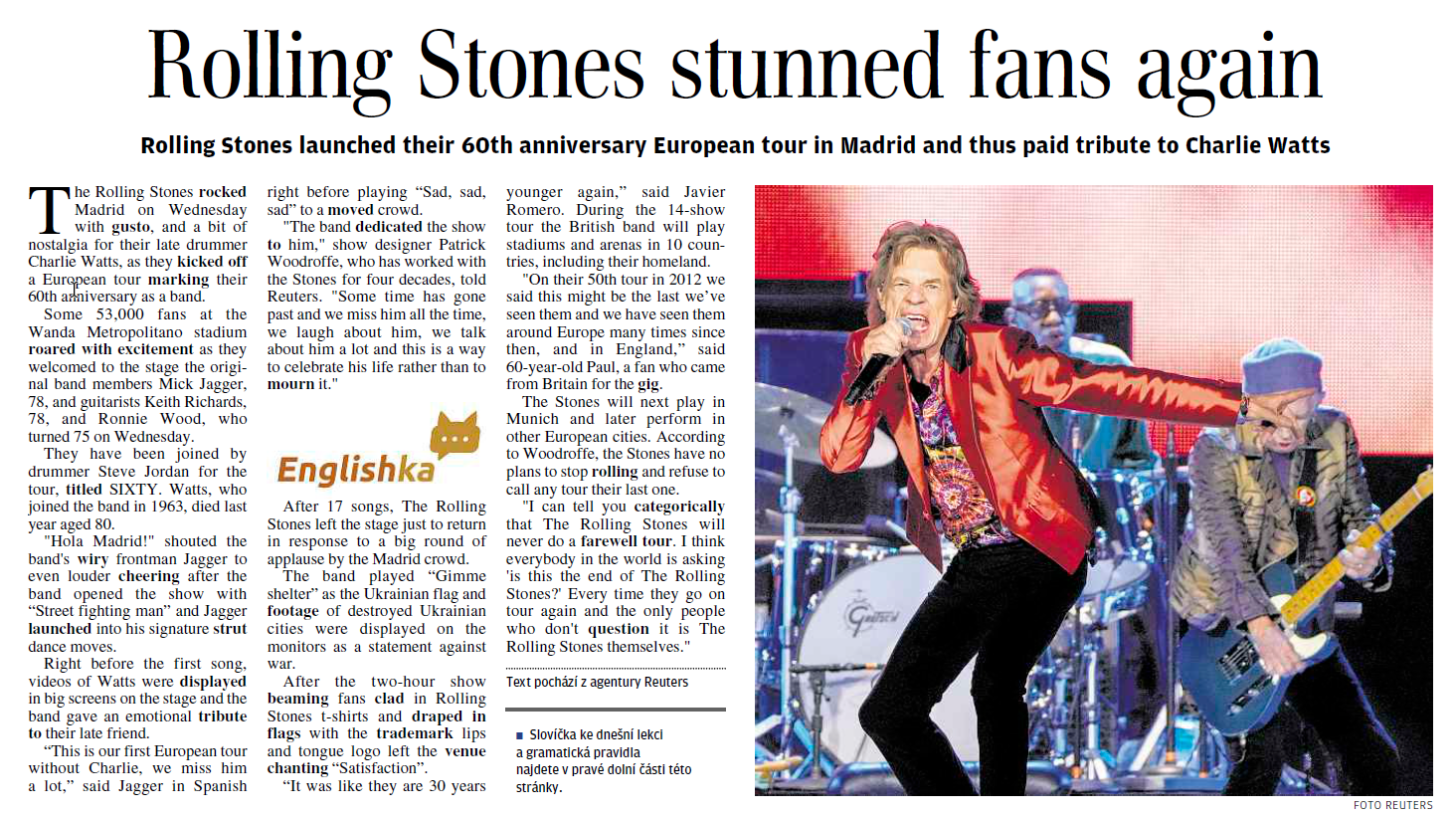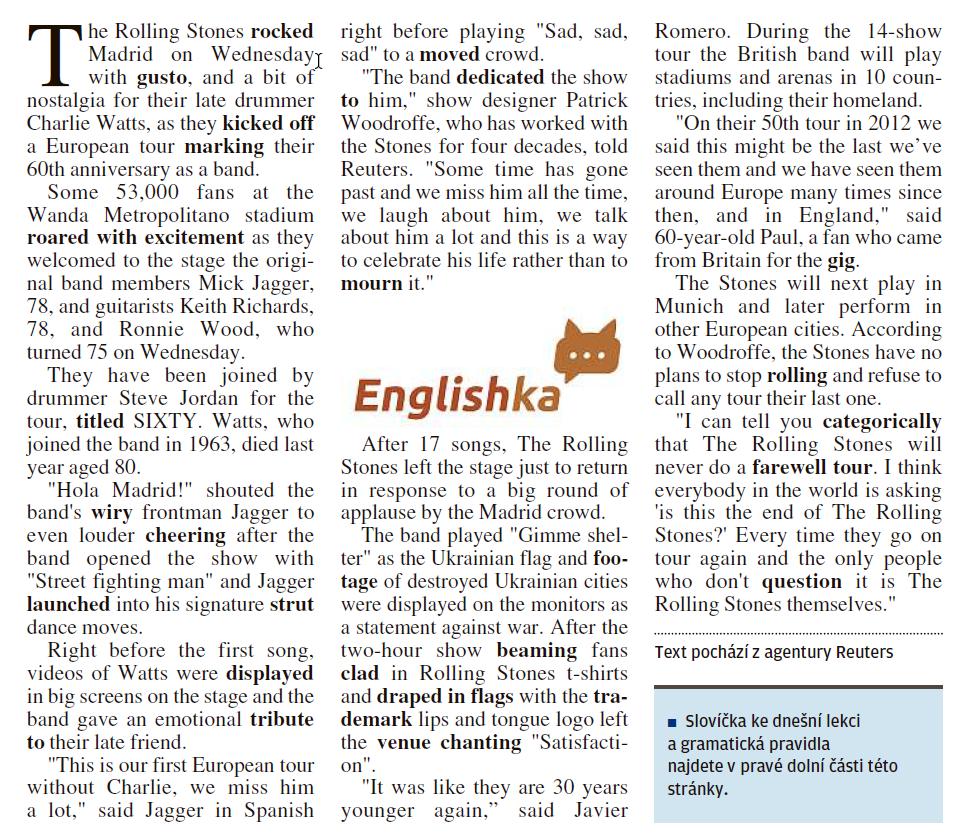Angličtina pro pokročilé s novinovými články (1.) – Rolling Stones

Přečtěte si článek a projděte si slovní zásobu, gramatiku a cvičení, které najdete v přiloženém souboru dole. Celý text si také můžete stáhnout společně s nahrávkami od rodilého mluvčího.
Procvičování je vhodné pro úroveň B1 a vyšší.
1. Novinový článek
Rolling Stones stunned fans again
Rolling Stones launched their 60th anniversary European tour in Madrid and thus paid tribute to Charlie Watts

The Rolling Stones rocked Madrid on Wednesday with gusto, and a bit of nostalgia for their late drummer Charlie Watts, as they kicked off a European tour marking their 60th anniversary as a band. Some 53,000 fans at the Wanda Metropolitano stadium roared with excitement as they welcomed to the stage the original band members Mick Jagger, 78, and guitarists Keith Richards, 78, and Ronnie Wood, who turned 75 on Wednesday.
They have been joined by drummer Steve Jordan for the tour, titled SIXTY. Watts, who joined the band in 1963, died last year aged 80.
„Hola Madrid!“ shouted the band’s wiry frontman Jagger to even louder cheering after the band opened the show with „Street fighting man“ and Jagger launched into his signature strut dance moves.
Right before the first song, videos of Watts were displayed in big screens on the stage and the band gave an emotional tribute to their late friend. „This is our first European tour without Charlie, we miss him a lot,“ said Jagger in Spanish right before playing „Sad, sad, sad“ to a moved crowd.
„The band dedicated the show to him,“ show designer Patrick Woodroffe, who has worked with the Stones for four decades, told Reuters. „Some time has gone past and we miss him all the time, we laugh about him, we talk about him a lot and this is a way to celebrate his life rather than to mourn it.“
After 17 songs, The Rolling Stones left the stage just to return in response to a big round of applause by the Madrid crowd.
The band played „Gimme shelter“ as the Ukrainian flag and footage of destroyed Ukrainian cities were displayed on the monitors as a statement against war. After the two-hour show beaming fans clad in Rolling Stones t-shirts and draped in flags with the trademark lips and tongue logo left the venue chanting „Satisfaction“.
„It was like they are 30 years younger again,” said Javier Romero. During the 14-show tour the British band will play stadiums and arenas in 10 countries, including their homeland.
„On their 50th tour in 2012 we said this might be the last we’ve seen them and we have seen them around Europe many times since then, and in England,“ said 60-year-old Paul, a fan who came from Britain for the gig.
The Stones will next play in Munich and later perform in other European cities. According to Woodroffe, the Stones have no plans to stop rolling and refuse to call any tour their last one.
„I can tell you categorically that The Rolling Stones will never do a farewell tour. I think everybody in the world is asking ‚is this the end of The Rolling Stones?‘ Every time they go on tour again and the only people who don’t question it is The Rolling Stones themselves.“
2. Slovíčka
rock [rɒk] otřást
gusto [ˈgʌstəʊ] elán, nadšení
kick off [kɪk ɒf] odstartovat
mark [mɑːk] připomínat si
roar with excitement [rɔː wɪθ ɪkˈsaɪtmənt] řvát, křičet nadšením
titled [ˈtaɪtəld] nazvaný, s názvem
wiry [ˈwaɪərɪ] šlachovitý
cheer [tʃɪə] fandit, povzbuzovat
launch [lɔːntʃ] spustit, rozjet
strut [strʌt] naparovat se, vykračovat si
display [dɪˈspleɪ] ukázat, zobrazit
tribute to sb [ˈtrɪbjuːt] projev úcty, pocta komu
moved [ˈmuːvd] dojatý
dedicate to sb [ˈdedɪˌkeɪt] věnovat komu
mourn [mɔːn] truchlit
footage [ˈfʊtɪdʒ] záběry
beaming [biːmɪŋ] rozzářený
clad [klæd] oblečený
drape in flags [dreɪp ɪn flægz] zahalit se do vlajek
trademark [ˈtreɪdˌmɑːk] obchodní značka
venue [ˈvenjuː] místo konání
chant [tʃɑːnt] skandovat, zpívat
gig [gɪg] koncert, vystoupení
roll [rəʊl] válet (hov.)
categorically [ˌkætɪˈgɒrɪkəlɪ] rozhodně
farewell tour [ˌfeəˈwel tʊə] turné na rozloučenou
question [ˈkwestʃən] zpochybňovat
Článek a nahrávky
KE STAŽENÍ ZDARMA
Stáhněte si novinový článek Rolling Stones stunned fans again společně s nahrávkou článku a slovíček od rodilého mluvčího a procvičujte angličtinu kdykoliv a kdekoliv.
3. Gramatika a cvičení
V dnešním článku jsme se setkali s výrazem rather than: „Some time has gone past and we miss him all the time, we laugh about him (…) and this is a way to celebrate his life rather than to mourn it.“ Rather
than tady přeložíme jako spíše než.
Příslovce rather se běžně používá k označení 1) míry a stupně nebo 2) preference.
1) V prvním případě stojí rather před přídavným jménem nebo příslovcem a překládá se jako docela, poměrně. Např. „Eva’s got a rather big house.“ („Eva má docela velký dům“.)
2) V druhém případě se často používá výraz would rather (běžně zkracované na ‘d rather).
Toto spojení znamená raději by.
Pozor! Za would rather používáme holý infinitiv (inf. bez TO), např. „I’d rather be somewhere else“. („Raději bych byl(a) někde jinde.“)
Přeložte:
- I would rather not go.
- It’s rather late.
- I drink tea rather than coffee.
- I’d rather walk than wait for a bus.
Řešení:
- Raději bych nešel.
- Je docela pozdě.
- Piju spíš čaj než kávu.
- Raději bych šel pěšky, než čekal na autobus.



